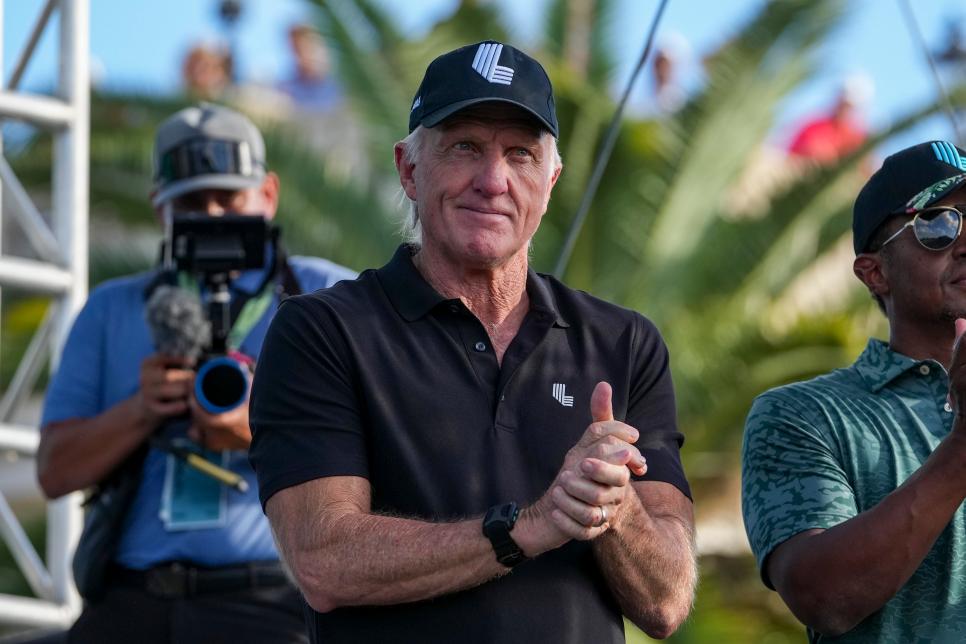Editors' Roundtable
The good, the bad and the unknown about the PGA Tour’s new ‘Designated Events’ model

The news rattled through golf like a shockwave, rumbling from Florida to Puerto Rico. Ahead of the Arnold Palmer Invitational in Orlando and the concurrent Puerto Rico Open, PGA Tour Commissioner Jay Monahan spelled out in a memo to players released on Wednesday how most tournaments that were just this year raised to a “designated” level with $20 million purses would be altered again for 2024 by limiting the fields in some to 60 to 70 players, with no cut.
The changes have many implications—most notably, the stars getting richer, while rank-and-file players vacillate between wondering if they’re facing a closed shop and counting the extra cash they may earn when the biggest names are on vacation. As World No. 8 Max Homa pointed out a couple of weeks ago, the financial roof is being raised while the bottom floor remains the same—and that surface is more marble than laminate.
However, these are times when the sport is the subject of constant debate—about money, about loyalty, about tradition, about the future. And this latest big news from the PGA Tour warrants as much thought as anything else of late, so Golf Digest’s editors and writers participated in a roundtable to share opinions about how elite fields and no cuts could impact the tour for years to come. —Tod Leonard
Are there enough routes/spots open for pros to play their way into these reimagined designated events?
Shane Ryan: The more you learn about tour history, the more you learn about the push-and-pull between benefiting the best and most famous players (a “rich get richer” system) and having a very democratic, merit-based tour with plenty of opportunity for the rank-and-file (dirty, dirty socialism ... to some). And, right now, that balance tipped to the better players because there is a really lucrative alternative for the world's best golfers. So, no, there aren't enough spots, but I also completely get why the tour is doing this and why it feels like it has to do this—it satisfies the elites while strengthening the fields of the non-designated events … and it does that while maintaining some drama for the guys trying to fight their way into the top level.
Joel Beall: No, although the counter is that for decades the tour has catered too much to the rank-and-file. The universal refrain from observers during the ongoing schism is that the tour had to protect its remaining talent from defecting. This new system should accomplish that. The worry is how much of the tour’s spirit was compromised because of it.
Dave Shedloski: Sure doesn't sound like it. But does there need to be enough routes? Fans might not care a lick as long as they get to see Rory, Jordan, et al.
Tod Leonard: Absolutely. Finish in the top 50 in the FedEx Cup; earn your way into the top 10 of the current FedEx Cup standings; get hot at the right time; win a tournament during the year; be in the top 30 in the World Ranking. Those are perfectly acceptable criteria for events of this magnitude. Not everybody deserves a participation ribbon.
Evin Priest: Yes. The players have all season to progress to the BMW Championship to get into the 2024 designated events. They can also win a tour event. Five spots from each swing of non-designated events are plenty to be able to play your way in.
Does the no-cut format diminish the competition?
Steve Hennessey: Yes. The cutline drama is some of the most underrated suspense fans get to enjoy (if the telecast tells the story properly). When you lose this in some of the biggest events, it will be way easier for players to mail it in if they don’t get off to a hot start. That is diminishing the product.
EP: For some events, it could. Legacy events like Riviera and Memorial should maintain a cut. But outside of those, who really cares if there's a cut at Wells Fargo or Travelers?
DS: Hardly. If that were true, we'd be thinking differently about 20 of Tiger's career 82 PGA Tour wins, which came in no-cut tournaments.
TL: If anything, it enhances it, at least from an on-site fan and TV viewership standpoint. To paraphrase Rory McIlroy, fans don’t want to spend big bucks on a ticket for Saturday and miss a star who happens to get off to a slow start. I’d wager that most people don’t care if their favorite guy wins; they just want to see him in the flesh.
SR: My gut tells me that come Sunday, when the world's best players are coming down the stretch, we're not really going to care whether the field was culled on Friday.
JB: At its heart, professional golf is appreciated for being the purest rendition of meritocracy, where spots aren’t given, and you only make what you earn. One of the tour’s biggest selling points was that LIV was the antithesis of this ethos. Now the no-cut element opens the tour up for the very ridicule that was directed at its opponent.
LIV Golf said the tour just copied LIV. Do you agree?

Eric Espada
DS: LIV Golf claiming some kind of credit for no-cut tournaments when no-cut tournaments existed before LIV Golf is ... something. But chutzpah has been a constant from Greg Norman and some of his more vocal participants since its outset.
EP: Not really, because no-cut, reduced fields with bigger purses existed before LIV in WGCs and events like CJ Cup and Zozo. But I do think LIV proved there's an appetite for making golf tournaments more about entertainment than pure competition.
JB: LIV Golf copied its entire concept from the Premier Golf League, so perhaps the Saudi circuit and its members shouldn’t be throwing stones.
SR: Until the Tour starts playing team golf with a shotgun start, I think they're safe from copyright charges
TL: Most of LIV Golf’s squawking is to beg for woefully needed attention rather than make cogent points. Not much to crow about when you’ve got 48 guys playing 54 holes.
What are the downsides of this plan?
EP: There aren't too many, other than the unknown effect of what could happen if you mess with the cut. It rules out players who just aren't playing well that week.
DS: From a marketing standpoint, not sure there is any downside. If all the best players convene at these tournaments, as they did for the WGCs, then it's sure to be successful. Could there be some staleness to it? Perhaps. Same guys in the same format for the same huge purses ... are we all good with that? And what about the quality of the golf top to bottom? That was a criticism of events like the WGC event in Akron, where playing poorly didn't seem to bother some players if they crashed in the first round. Some going-through-the-motions tended to commence.
JB: For months we’ve heard the need for younger talent to have more tour accessibility in the fledgling stages of their careers. This endeavor does the opposite.
SH: I understand Max Homa’s and Patrick Cantlay’s points that the new changes don’t alter the schedule from 2023 for the players ranked outside the top 70, but the point they’re ignoring is that 2023 was already such a gigantic change from previous years. Now the rank-and-file players are being alienated even further. Kevin Chappell, a Presidents Cup player not too long ago, said on Twitter, “Look for players 51-70 on FedEx list to leave and go take the guarantee elsewhere. If you’re LIV it becomes easier to recruit players.” That, to me, sums up why this is not a good thing for the majority of PGA Tour players.
SR: Fundamentally, it makes the tour less democratic, and a paranoid mind might wonder where this all leads when the players are driving the bus. Hypotheticals aside, for eight events per year, there's a certain spirit of player equality that will be lost in service of powerhouse fields with lots and lots of money to hand out. But again, it's not every tournament, and from a practical business standpoint, they're going to reap some big benefits here. If "idealism" is the thing being lost, well … that's a nebulous concept, and we don't exist in a golf landscape where the tour can afford to live and die by egalitarian notions.


